What does a sound engineer do and how do you become one?
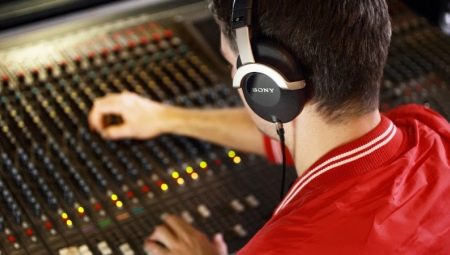
In the modern world, the distribution of labor is increasingly shifting towards the service sector. A machine can also be a "hard worker", and a person is a higher being, he must engage in mental or creative work. Any of the current working professions can sink into oblivion in the next twenty years, but a sound engineer is both interesting and well paid, and certainly not endangered in the near future.
Who is this and what is he doing?
One of the main features of the specialty is that the work can look very different, and such a specialist is in demand in many areas of activity. In fact, the sound engineer is the person who is responsible for creating sound images. You hear musical accompaniment and voice acting in movies or radio shows, at a performance in the theater - it is the sound engineer who collects it.
But the job description of such an employee is not limited to this - if he does not have a ready-made sound effect at his disposal, he must record it himself, having figured out how to reproduce the necessary sound, and making sure that the quality of the recording is at the level. He is also engaged in further processing of the sound recording.
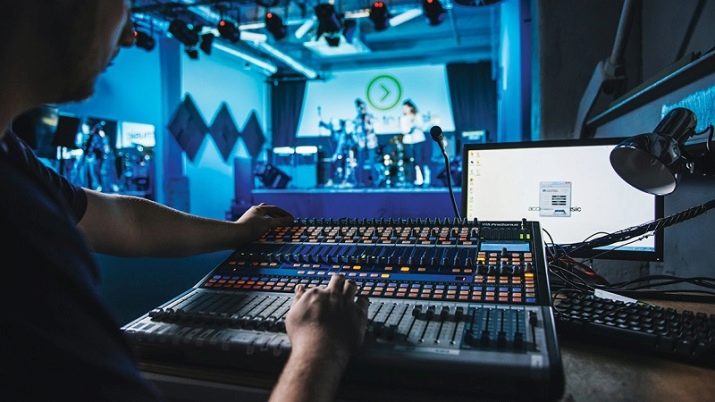
Concert sound engineer is engaged in other activities Is an indispensable assistant for a cultural center, where live performances often take place. The duties of such an employee include ensuring decent sound quality, which has to be configured directly in Live mode. The description of the activity can be similar sound engineer and on the radio, but there he is often engaged in parallel with what was described above - he creates soundtracks for advertising, comes up with intros, beats, and so on, is engaged in their recording and mixing. In this context the sound engineer can be a full-time employee and in an advertising agency, and in a recording studio, and many other places. In today's world, you shouldn't be surprised at sound engineering as a freelance.
It is better to summarize the description of the activities of such a professional in a thesis. He does the following:
- selects sound solutions;
- supervises the installation of audio equipment on stages or in studios, checks the correctness of its work, makes the necessary changes;
- records and edits audio tracks - both music and voice, creates phonograms;
- responsible for the quality of sound recording or live sound;
- adjusts the sound at any public events or live broadcasts, makes sure that the quality of sound transmission does not drop regardless of the development of events;
- develops arrangements for compositions.
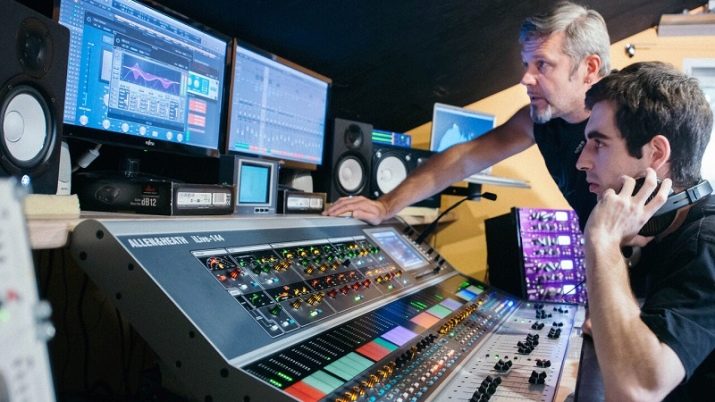
Pros and cons of the profession
As in any other job, in the profession of a sound engineer you can find both bright and positive features, as well as characteristics that are more likely to be negative. When choosing a specialty, it is worthwhile to clearly understand what the pros and cons are, therefore we will consider what and how. Let's start with the benefits of being a sound engineer.
- Work - creative... This is not an activity where your back can get torn. One does not become a sound engineer out of despair - this is a dream to which everyone goes purposefully.
- There are a number of related professions. A sound engineer is required in many areas, but he, as a rule, is needed one. However, when looking for vacancies, this will not be a problem, because there are similar positions that can be taken with a sound engineering education. Sound engineer and microphone operator are alternative ideas of how to work almost professionally.
- Theoretically there is access to the "stars"... Most people see their idols at best a few times in their entire lives, and even then on stage and at a considerable distance, and for decent money. Whether working on the radio, in a recording studio or in a prestigious concert hall, you will see them regularly, right in front of you, and even free. Even working in a provincial theater, you will communicate with interesting and well-rounded people, and not with ordinary people.
All this, of course, looks very good and interesting, but you shouldn't forget about the shortcomings - they can turn out to be significant.
- Forget about working hours. Unless you work on the radio, you may not have a replacement. If the equipment is not functioning or you cannot record the desired track in any way, and the performance is already tomorrow, you will go home only at the cost of being fired. The schedule can be very busy and you won't always meet it.
- Be prepared for business trips or modest earnings. The best sound engineers are often dismantled by the very "stars" in order to take them with them on concert tours. Such a mode of life is not for everybody, because not everyone will like to wake up every day and go to work in a new city.
- Substantial physical activity is possible. Responsibility for equipment and good sound often means that you have to carry all the equipment yourself.
A concert sound engineer is often also required to perform the functions of a loader, and so - every day.


How is it different from a sound engineer?
As stated above, sound engineer is a specialty that allows work in a number of related professions. Nevertheless, not in all cases the positions are interchangeable, therefore the applicant should clearly understand where and for whom he is applying. For example, sound engineer is often confused with sound engineer, and these are perceptibly different things.
The difference between the two professions is that the sound engineer is a much less creative (and at the same time less prestigious) position.... If the first is a creative person who is well versed in technology, then the second is a purely "techie". Roughly speaking, a sound engineer is a person at the control panel who monitors the volume of useful sound and noise in Live mode, and makes sure that the former is sufficient, and the latter is minimal. You can find other definitions of the specialty of a sound engineer, and it is possible that somewhere you will even be taught more than is usually taught to a sound engineer.
Another thing is that a sound engineer will be easily hired “for a move”, but whether the employer will hire a sound engineer for the position of sound engineer is a big question, if they did not know each other before.
Requirements
To be a good sound engineer, you must initially meet certain requirements, and study hard. Professional standard in this case, it consists of two parts - innate or sustainably developed personal qualities, as well as knowledge and skills acquired during training.
Personal qualities
The activity of a sound engineer is inextricably linked with sounds and music, therefore it is highly desirable have an ear for music and subtly feel the beauty... Only rich imagination and good perception will help evoke the necessary emotions in the listeners through sound, so these qualities are very important. The specialist must remember sounds well in order to be able to reconstruct what he once heard.
To create sound images, the professional must be quite erudite in all areas, clearly imagine what associations this or that reception will evoke in the public. Since the activity is creative, he must understand that no conquered peak is absolute - you can always move forward, you need constantly learn from colleagues, even if so far they are supposedly lagging behind.
At the same time, the sound engineer must also simply love his work - this is the only way he can continue to work productively, despite the irregular schedule and the complexities of life according to the concert schedule.
Knowledge and skills
Having entered a suitable university, you will study according to an approved program and you are unlikely to miss something, but it still doesn’t hurt to know in advance what you will have to learn. The work of a sound engineer involves confident orientation in a number of specific areas of knowledge. - for example, in acoustics and physics of sound. Such knowledge will allow you to understand how the shape of the room and the material of the wall decoration affect the sound. After training, you will learn how to level the disadvantages of those rooms where you have to set up or record sound. Over time, this can be used for their own purposes - for the purposeful creation of various sound effects.
Undoubtedly, a professional should be comfortable with sound editors for a computer. Programs such as Sound Forge, Adobe Audition, or even Fruity Loops will be very helpful in creating skips and sound savers. If in your activity you still rely on an element of creativity and independent creation of sound tracks or at least arrangement of strangers, then you cannot do without the appropriate software.
Finally, the sound engineer must be able to handle sound equipment and understand it perfectly... To do this, it is worth knowing the technical parameters and capabilities of the mass of models of consoles, amplifiers, microphones, and so on. Even new and high-quality equipment can produce poor sound - simply because it has been set up incorrectly, used in the wrong way, or simply unwisely placed.
A professional should be able to avoid such problems or quickly solve them if they have already appeared.
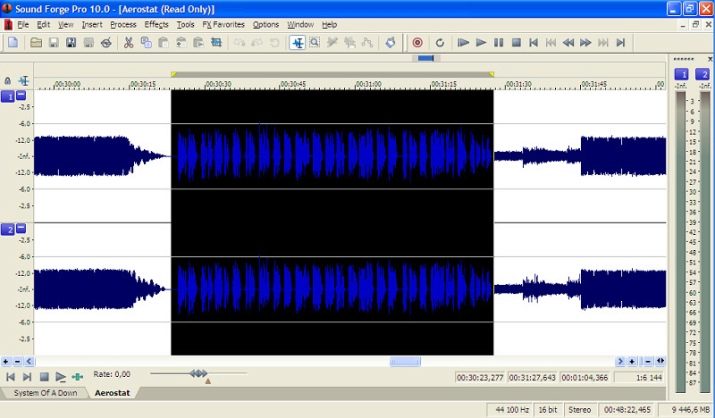
Education
Sound engineer is not a profession that you can enter from scratch and achieve success. Modern technologies make it possible to undergo superficial training in many specialties at home, sitting at a computer. Many people think that becoming a sound engineer can be so easy - having mastered several audio editors and learning how to glue tracks in them. In principle, at some minimum level, this will be enough, but a person who dreams of a high-profile title of a sound engineer hardly sees himself as a DJ in a simple club or an assistant toastmaster at weddings. As for serious plans for a career, then for the sake of their implementation you will have to go to college and get a higher education.
It should be noted that various specialized courses will not have a positive effect on your prospects.... Perhaps the teachers there are really good, and they will teach you how to use the equipment, but the document they will issue will not be convincing. An employer in this area will never take risks and allow a person with a dubious "crust" to do such a responsible job, and he simply cannot check a potential employee in idle conditions. By the same logic, it doesn't make much sense to go to college - for the sake of worthy prospects, one should pay attention only to universities. There you will be taught such complex and specific subjects as, for example, the physics of sound, and you will become a real professional.
Do not think that sound engineer is taught only in Moscow - in any large city there is a university that provides an opportunity to study a specialty. It is necessary to focus on those educational institutions where there are music, theater or, in general, creative departments. The most prestigious diplomas will be given by such giants as Moscow State University, Russian State University for the Humanities, Institute of Contemporary Art, Russian Academy of Music. Gnesins, Moscow Conservatory Tchaikovsky. However, the list does not end there.
It is better to clarify in each individual university about which subjects you need to take exams for admission - the requirements can change from year to year and depending on the specification of the institution.

How much does a sound engineer earn?
Creativity is great, but people usually go to work for the sake of a salary. The sound engineer receives, to put it mildly, in different ways - it all depends on how you manage to "break through."
The average Russian salary of a sound engineer usually varies between 35-60 thousand rubles, but one should not dream of such money right away. Somewhere in the province, a newcomer can easily get 15 thousand, and a large city would give him more, but still not too much - 20-30 thousand. Having got hold of work experience, you can get 30-50 thousand - a lot depends on where you settled down, in a conventional theater, a house of culture or a recording studio. Pros at the pinnacle of success, partnering with record brands, film studios or famous musicians, can earn many times the amount listed.
Freelancing in the industry generally does not allow to adequately estimate the salary in advance - it all depends on what kind of work you are ready to take on, how many orders you manage to get and complete. As for the activities of a sound engineer-DJ, there you can count on 1-3 thousand rubles per shift, but again, it all depends on the level of your fame and the prestige of the venue where you perform.









